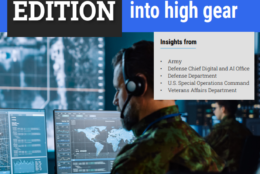artificial intelligence
-
As Navy ships near the end of each deployment cycle, crews plan and prepare for maintenance and scheduled system and compartment modernization that can’t be performed underway. These tasks require accurate, up-to-date data on each…
August 03, 2023 -
Intelligence Community Chief Data Officer Lori Wade says a new IC data strategy prioritizes a more data-savvy workforce, and sets the groundwork for the IC to use artificial intelligence tools.
July 18, 2023 -
The Defense Department has been steadily developing artificial intelligence capabilities. But how should it go about purchasing AI tools? To get some ideas, the Government Accountability Office recently looked into how a handful of companies handle it.
July 12, 2023 -
As cyberattacks continue to grow both in number and sophistication, government agencies are struggling to keep up with the ever-evolving threat landscape.
July 05, 2023 -
Recently, the Equal Employment Opportunity Commission (EEOC) released a technical assistance document which laid out certain confines employers will need to operate in if they're using artificial intelligence during the hiring process. There have already been a few cases where unintended discrimination affected some companies hiring initiatives.
June 06, 2023 -
As a government agency, responsible governance is key to unlocking the benefits of AI while mitigating its risks. We must establish clear and comprehensive regulations and standards that ensure AI is used ethically and safely. At the same time, we must be vigilant about the potential for bias and misuse of AI and work to prevent these issues.
May 25, 2023 -
DoD introduced a new plan to modernize records keeping and make it more accessible as agencies move away from paper records.
May 23, 2023 -
Artificial intelligence has evolved from a basic tool to one of the most powerful resources available since the first chatbot ELIZA was deployed over five decades ago.
May 23, 2023 -
The Air Force is updating its strategy for intelligence, surveillance and reconnaissance to include more sensors and more digital infrastructure.
May 18, 2023 -
Percipient.AI alleges NGA and prime contractor CACI are ignoring a law requiring agencies to buy commercially available products.
January 13, 2023 -
An enduring challenge for military IT people: getting just the right information securely to people who need it, especially in contested environments. Now researchers from the Air Force Research Laboratory's Information Directorate think they have a solution.
January 06, 2023 -
Edge computing enables NOAA to push workloads closer to public consumers, not just field researchers
Frank Indiviglio, NOAA’s deputy director for High Performance Computing & Communications (HPCC), said conversations are happening about how NOAA can containerize its climate models in order to push the models themselves out to the public to understand, build upon and tweak.
January 05, 2023 -
The new Chief Digital and AI Office has plans to make AI development and buying more agile at DoD. Get details on these efforts and also learn about use cases in the Army, the U.S. Special Operations Command and Veterans Affairs.
September 23, 2022 -
In today's Federal Newscast: Government officials think artificial intelligence could lead to a real bias in hiring. The Post Office plan to transport more mail through railroad contractors is off the rails. And a Midwest senator wants to turn up the heat on federal agencies — literally.
September 19, 2022 -
Krista Kinnard is a finalist in the emerging leaders category of this year's Service to America Medals program. She serves as chief of emerging technology at the Labor Department
June 16, 2022














